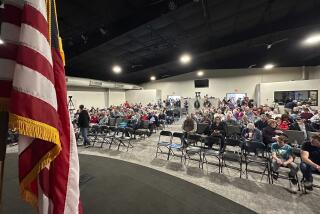Iowa Poll Puts Dole 16 Points Over Bush
- Share via
NEW YORK — Senate Minority Leader Bob Dole of Kansas holds a 16-point lead over Vice President George Bush among Republicans likely to attend the Iowa caucuses next February, an NBC News poll says.
On the Democratic side, Sen. Paul Simon of Illinois and Massachusetts Gov. Michael S. Dukakis are tied in Iowa. Missouri Rep. Richard A. Gephardt, who led in some early Iowa polls, was in third place, the survey released Monday shows.
In New Hampshire, which holds the first presidential primary in 1988, another NBC poll said Bush remains the front-runner among Republicans, while Dukakis holds a big lead in the Democratic field.
A national CBS News-New York Times poll, also released Monday, said the public’s view of both presidential nominating contests has changed little in the past month. Bush has slightly widened his lead nationally over Dole, and the Rev. Jesse Jackson is in front on the Democratic side, although the largest number of Democrats are undecided.
Riding an unusually high positive rating from Republican activists in Iowa, Dole received the backing of 42% of the likely caucus attendees, compared to 26% for Bush. That is a larger margin for Dole than other polls in the state have shown.
Former television evangelist Pat Robertson received 7%, and Rep. Jack Kemp of New York 6%. Former Delaware Gov. Pierre S. (Pete) du Pont IV was the choice of 3%, while former Secretary of State Alexander M. Haig Jr. received 1%.
Fifteen percent of the 815 likely caucus attendees interviewed by telephone from Nov. 15-21 were undecided. The NBC News polls were also conducted at that time.
Eighty-one percent of those interviewed gave Dole a favorable rating, with only 16% rating him negatively. Bush got positive marks from 68% and negative ones from 16%.
William E. Brock III, Dole’s campaign manager, said he was pleased by the results, but does not give them too much weight.
“I think we way overstate the value of polls. . . . We’ve got to treat it as a horse race all the way down to the wire, and we’ve got to take it one step at a time,” he said.
Among the 809 likely Democratic caucus-attendees in Iowa, Simon and Dukakis were knotted at the top among candidates--although undecided is still the biggest category.
Simon has the backing of 21% and Dukakis 20%. Thirty-three percent were undecided.
Gephardt, who has worked in Iowa for the Democratic nomination longer than any other candidate, received 10%. After front-runner Gary Hart withdrew in May, Gephardt was on top in several Iowa polls. This survey also said more than a third of the Democrats were unable to rate Gephardt favorably or unfavorably, a high number for a politician who should be well-known there.
Jackson drew 9% backing in Iowa, while former Arizona Gov. Bruce Babbitt had 5%.
Sen. Albert Gore Jr. of Tennessee, who has cut back his Iowa efforts, received 1% support, and 1% volunteered that they wanted someone else.
But the news remained good for Bush in New Hampshire, where the NBC News poll put his support at 41%, well ahead of Dole’s 21%.
In the Granite State, Kemp drew 8%, Du Pont 4% and Haig 3%. A total of 20% of the 1,145 likely Republican primary voters were undecided.
Among 842 likely Democratic primary voters in New Hampshire, Dukakis drew strong backing in his neighboring state. Forty-nine percent backed Dukakis, with Simon a distant second with 13%.
The remainder of the field trailed: Jackson, 4%; Gore, 4%; Babbitt, 3%, and Gephardt, 3%. One percent cited someone else, and 23% were undecided.
Nationally, the CBS News-New York Times poll gave Bush the lead among Republicans, 48% to 20% over Dole. Robertson had 7%; Kemp 5%; Haig, 4%, and Du Pont, 2%. Eleven percent of the 383 registered Republicans were undecided.
Across the country among Democrats, the poll said undecided was still way out in front with 42% of the 576 registered Democratic voters. Jackson drew support of 25%; Simon, 10%; Dukakis, 9%; Gore, 6%; Gephardt, 5%, and Babbitt, 1%.
All random sample surveys are subject to possible errors simply because of chance variations in the sample.
For polls based on 300 to 600 interviews, the sampling error margin is about five percentage points either way. For polls based on about 800 interviews, the error margin is about four percentage points. For polls based on about 1,200 interviews, the sample margin is about three percentage points.
More to Read
Get the L.A. Times Politics newsletter
Deeply reported insights into legislation, politics and policy from Sacramento, Washington and beyond. In your inbox twice per week.
You may occasionally receive promotional content from the Los Angeles Times.










